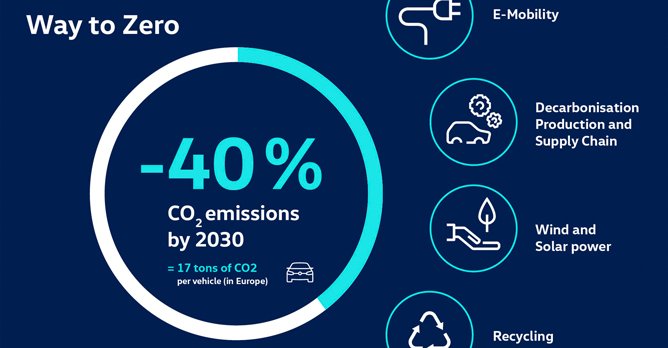Way to Zero: Volkswagen presents roadmap for carbon-neutral objectives
11 May 2021|1,015 views
At the inaugural Way to Zero Convention, Volkswagen outlined its plans on decarbonising the company's existing manufacturing processes and products, with the overarching goal of attaining net carbon neutrality by 2050. To this end, an interim milestone of a 40% reduction in carbon dioxide emissions per vehicle sold in Europe has been set for 2030. As well as accelerating the transition to e-mobility, the production, distribution, and operation of electric cars will be made emissions-free, and the systematic recycling of the high-voltage batteries from old electric vehicles.
A key factor in achieving carbon-neutral e-mobility is accessibility to electricity generated from renewable sources. Although Volkswagen-sponsored charging stations are widely available in Europe, the company intends to go one step further by financing the expansion of renewable energy on a large scale. New wind farms and solar plants are to be constructed in several regions of Europe by 2025.

In the production of its ID. family of vehicles, Volkswagen plans to switch to sustainably-sourced components, including battery housings and wheel rims made from recycled aluminium, and tyres from low-emission production sources.
At the heart of the Way to Zero is Volkswagen's 'ACCELERATE' strategy, aimed at stepping up the pace of electrification. By 2030, Volkswagen aims to have all-electric vehicle sales form at least 70% of all units sold in Europe. In addition, Volkswagen will be launching at least one new electric car model each year.
With the Way to Zero Convention, Volkswagen aims to foster an open dialogue with government, industry and society. The day-long event, which was entirely digital due to the coronavirus pandemic, was attended by more than 20 speakers from political parties, NGOs, scientific institutions and other companies alongside representatives of Volkswagen.
At the inaugural Way to Zero Convention, Volkswagen outlined its plans on decarbonising the company's existing manufacturing processes and products, with the overarching goal of attaining net carbon neutrality by 2050. To this end, an interim milestone of a 40% reduction in carbon dioxide emissions per vehicle sold in Europe has been set for 2030. As well as accelerating the transition to e-mobility, the production, distribution, and operation of electric cars will be made emissions-free, and the systematic recycling of the high-voltage batteries from old electric vehicles.
A key factor in achieving carbon-neutral e-mobility is accessibility to electricity generated from renewable sources. Although Volkswagen-sponsored charging stations are widely available in Europe, the company intends to go one step further by financing the expansion of renewable energy on a large scale. New wind farms and solar plants are to be constructed in several regions of Europe by 2025.

In the production of its ID. family of vehicles, Volkswagen plans to switch to sustainably-sourced components, including battery housings and wheel rims made from recycled aluminium, and tyres from low-emission production sources.
At the heart of the Way to Zero is Volkswagen's 'ACCELERATE' strategy, aimed at stepping up the pace of electrification. By 2030, Volkswagen aims to have all-electric vehicle sales form at least 70% of all units sold in Europe. In addition, Volkswagen will be launching at least one new electric car model each year.
With the Way to Zero Convention, Volkswagen aims to foster an open dialogue with government, industry and society. The day-long event, which was entirely digital due to the coronavirus pandemic, was attended by more than 20 speakers from political parties, NGOs, scientific institutions and other companies alongside representatives of Volkswagen.
Latest COE Prices
April 2025 | 2nd BIDDING
NEXT TENDER: 07 May 2025
CAT A$99,500
CAT B$117,003
CAT C$65,001
CAT E$118,001
View Full Results Thank You For Your Subscription.


















